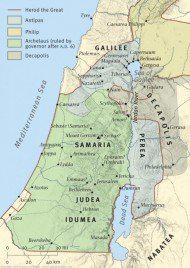The Unholy Seed - Part 38
WHAT IS GOING ON?
Copied from the sermon notes of Pastor Don Elmore
June 14, 2020
Scripture Reading: Nehemiah 9:1-3
Naomi, her husband and two married sons, had died. They had been living in the “country or land of Moab” for over 10 years. The Moabites had been living there but had been driven out for over 300 years. There were no Moabites who were living there at this time.
Her two sons, Mahlon and Chilon, were married to Ruth and Orpah. What were they to do after they were all widowed? The famine, the reason they had left Bethlehem, was over. Naomi suggested that they return to Bethlehem. But only Ruth said that she would return to Bethlehem with her, while her sister-in-law would go elsewhere. Where did she go? Did she find someone else to marry?

 Who was living in Palestine?
Who was living in Palestine?

